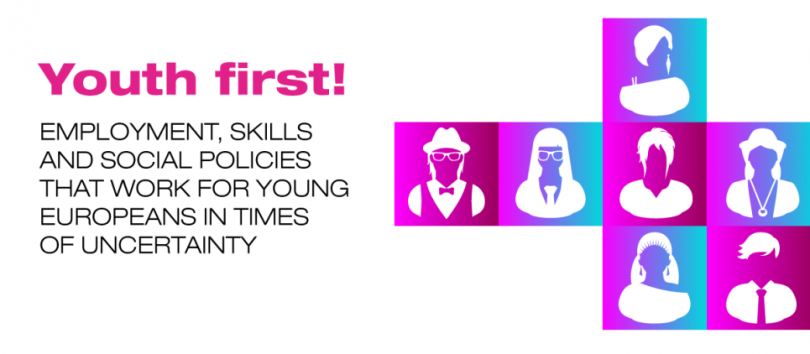
Making Europe work for young people
To mark the European Year of Youth, five EU agencies took part in an unprecedented seminar on 8 September, sharing insights and exploring the challenges and opportunities facing young people in these uncertain times. Organised at the European Parliament in Brussels in partnership with the institution's Employment and Social Affairs Committee, the Youth First! event brought together the directors of Cedefop, Eurofound, ELA, EU-OSHA and the ETF. Alongside MEPs and other experts, they discussed working conditions for young people, youth policies, wellbeing and mental health, access to education and training, opportunities for cross-border mobility, realities in EU neighbouring countries, and more.
A force for change
Kicking off the seminar, EMPL Committee Chair Dragos Pîslaru set the tone: "This is a paradigm shift," he said. Today, young people are the major agents of change. The rapid, far-reaching changes that are transforming our societies are being driven by technological advances, in which young people play a central role. The labour shortages that currently exist in the EU create a favourable labour market, with good prospects for employment.
Unique vulnerabilities
But for all that promise, young people are subject to a unique set of vulnerabilities. They have been hit hard by unemployment since the financial crisis of 2008/2009, and again by the after-effects of the COVID pandemic. EU youth unemployment stood at 13.6% in June 2022, double the overall rate. One in 10 young people are neither in employment, education or training. "It's a tragic waste of human capital," said Joost Korte, Director-General of DG Employment, Social Affairs and Inclusion.
New possibilities for young people
And yet this is a time of unprecedented opportunity, as digitisation transforms the labour market and the green transition opens up huge employment possibilities: 2.5 million new jobs are scheduled to be created between now and 2030 via the European Green Deal alone. "The future is here now," said Jürgen Siebel, Executive Director of Cedefop. In today's labour market, digital skills are no longer an option: nine out of 10 jobs require them. And today's tech-savvy young people are uniquely well-placed to take advantage of the opportunity. "To drive the green and digital transitions, the best thing you can do is open up employment to the younger generation," said Siebel.
Vocational education and training (VET): the key to success
If youth constitutes an invaluable resource, VET institutions are the tool that unlocks it, transforming young people into drivers of innovation. VET creates transitions: from education into work, and from one job into another. Strong VET systems reduce youth unemployment, and also help people to develop key entrepreneurial skills. The EU's VET sector has increased impressively, but supply-side initiatives now need to be balanced with youth-oriented matching policies among employers. "Investing in VET generates a high return over a long period," said Mara Brugia, Deputy Director of Cedefop. "I call on all young people to seize the opportunities that VET has to offer."
Changing societies, new needs
Those opportunities are not limited to the green and digital spheres. Societal evolutions are driving labour shortages in sectors as diverse as construction and care, creating useful opportunities for young people entering the labour market. "The shortages aren't only for highly-skilled jobs, but for medium- and low-skilled jobs too," said Irene Mandl, Head of Unit at the ELA. "There's something for everyone, and that's good news for young people, because these are openings with a long-term perspective." They are also subject to spatial mismatches, with opportunities arising in different countries to those with available labour. In this context, the ELA works to help young people identify future job possibilities, and then to bring supply and demand together.
Beyond the EU
The repercussions of all this spread far beyond the EU itself. ETF ad interim Director Xavier Matheu explained how EU policies are inspirational for the EU's neighbours. And it's a two-way street. "Those countries impact us in turn," said Matheu. "At this point in time, it's clear to see how important it is that we invest in their stability." The rates of people not in employment, education or training (NEETs) in EU neighbour countries are substantially higher than inside the bloc, running at 40% of young people in some cases.
"It's a very worrying situation," said Francesca Rosso, the ETF's Coordinator for Skills Demand Analysis: "Many young people find themselves excluded from the labour market. It's a waste of human capital, and it also has an impact on the security and stability of the countries concerned." As so often, the solution lies in education. Higher rates of education translate into lower NEET rates. "To prevent people from dropping out, you need educational programmes that are perceived as relevant by everyone concerned," said Rosso. "All too often, the programmes are out of date."
Putting Youth First!
So what can we do to address the needs of what Maria Rodriguez Alcázar – a Board Member at the European Youth Forum – termed "Generation Uncertainty"? A final round table demonstrated how all five EU agencies are already working together and providing crucial information. That information now needs to be translated into policy decisions. "It's not just about labelling it as youth policy and parking it in a box," said Dragos Pîslaru. "It's about mainstreaming: looking at things from a youth perspective, and then applying that to all our policies." By putting Youth First, the EU is on course to do just that.
To know more:
Event programme and speakers: https://www.ela.europa.eu/en/events/youth-first-employment-skills-and-social-policies-work-young-europeans-times-uncertainty
ETF presentation: Youth in focus: Youth at the heart of the ETF
Did you like this article? If you would like to be notified when new content like this is published, subscribe to receive our email alerts.